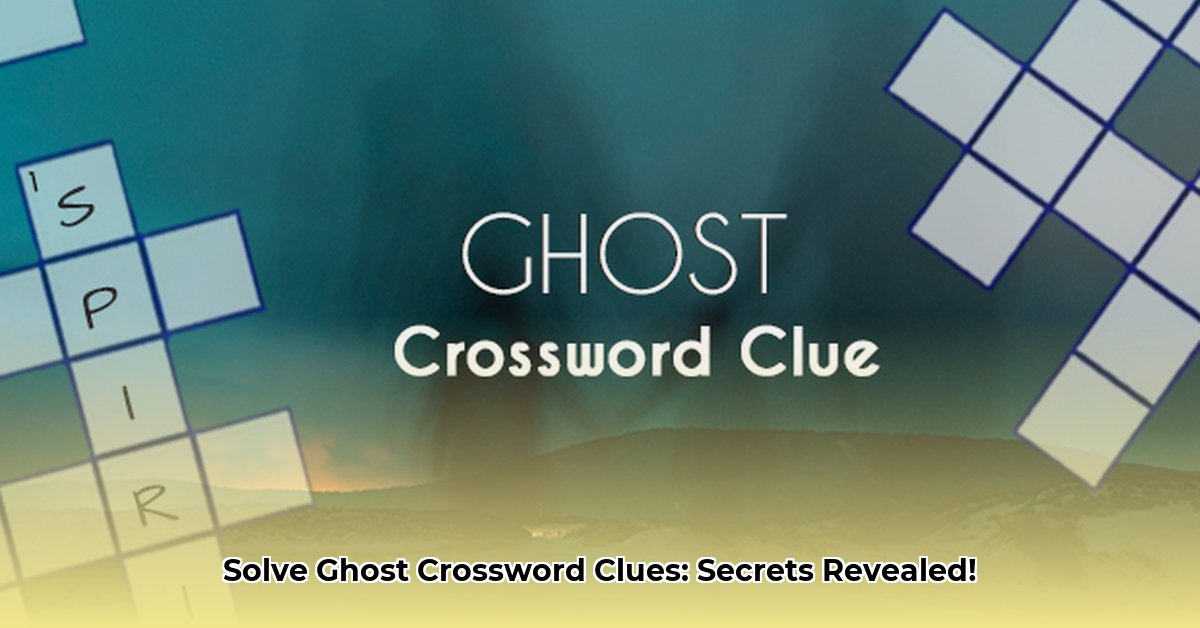Struggling with a “ghost” crossword clue? What seems like a straightforward word can unlock a surprising array of solutions. This comprehensive guide provides the keys to decoding these spectral puzzles, whether you’re a seasoned crossword aficionado or a curious beginner. We’ll explore common answers, unravel the nuances of clue construction, and equip you with practical strategies to conquer any ghostly grid. From leveraging online tools to mastering synonymy and understanding grid constraints, prepare to transform into a crossword-solving mastermind. For even more tips, check out this helpful guide: Ghost Crossword Clue Guide.
Decoding the Spectral Cipher: Unveiling “Ghost” Crossword Clues
The deceptively simple “ghost” crossword clue hides a wealth of possibilities, making it a surprisingly challenging puzzle piece. This guide empowers you to navigate this spectral spectrum of solutions, offering insights for both dedicated solvers and aspiring puzzle creators. Understanding the interplay of letter patterns, grid size, and cultural context is critical to achieving ghostly grid glory.
A Gallery of Ghostly Guesses: Exploring Common Crossword Answers
The solutions for “ghost” span a wide range of lengths, significantly influencing a puzzle’s difficulty. Shorter words like “spook,” “shade,” and “wraith” often grace easier puzzles, providing quick victories. Longer answers, such as “phantom,” “specter,” and “apparition,” typically haunt more challenging crosswords, demanding greater solver ingenuity. Cultural relevance further shapes the appropriateness of individual terms.
Think of shorter answers as playful poltergeists, easily captured within the confines of the grid. Longer answers, on the other hand, are akin to elusive entities, requiring a more extensive search across the entire crossword landscape.
The table below illustrates how answer rankings might fluctuate across various online crossword solvers. Remember that these rankings are estimates and dynamically adjust depending on the solver’s algorithms and data sets. Word length remains a consistently important factor in assessing potential solutions.
| Word | Length | Solver A Rank | Solver B Rank | Solver C Rank | Solver D Rank |
|---|---|---|---|---|---|
| Spook | 5 | 1 | 2 | 3 | 1 |
| Shade | 5 | 2 | 1 | 1 | 2 |
| Wraith | 6 | 3 | 4 | 5 | 3 |
| Spirit | 6 | 4 | 3 | 2 | 4 |
| Phantom | 7 | 5 | 5 | 4 | 5 |
| Specter | 7 | 6 | 6 | 6 | 6 |
| Apparition | 10 | 7 | 7 | 7 | 7 |
Note: These rankings are illustrative examples and may vary.
Unveiling the Puzzle’s Architecture: Decoding Solution Variations
Multiple factors contribute to the diversity of potential answers. The crossword grid’s dimensions play a pivotal role. Shorter words naturally fit more readily into smaller grids, making them frequent candidates in simpler puzzles. Conversely, more intricate puzzles, often featuring larger grids, tend to leverage longer, less common words. Puzzle creators navigate a constant balancing act between accessibility and challenge.
Word frequency also exerts a significant influence. Common terms like “spook” integrate seamlessly into the grid structure. Less prevalent words demand more deliberate placement within the puzzle’s overall design. Cultural context adds another layer of complexity, with certain words resonating more strongly with specific regions or generations.
Solver’s Arsenal: Mastering the Art of Deciphering Ghostly Clues
Let’s now delve into practical strategies for cracking those enigmatic “ghost” clues:
- Harness Online Crossword Solvers: Don’t hesitate to consult online crossword solvers to generate a spectrum of possibilities. These tools offer invaluable assistance, particularly when you’re stumped and need to cross-reference potential solutions.
- Embrace Synonymy: Synonyms and near-synonyms are potent weapons in your crossword-solving arsenal. Subtle variations, such as “specter” and “spectre,” can be the key to unlocking a puzzle.
- Cross-Reference with Precision: Intersecting clues provide invaluable hints. Leverage existing letters to narrow down the possibilities and eliminate unlikely answers, significantly enhancing your success rate.
- Respect Word Length Constraints: The allocated number of squares dictates the acceptable word length; always factor this crucial constraint into your spectral considerations.
- Consider Contextual Nuances: The surrounding clues and the puzzle’s overarching theme often provide vital clues to the correct answer, particularly when dealing with common synonyms.
Puzzle Creation Strategies: Conjuring Enigmatic Clues for Solvers
For puzzle creators, crafting effective “ghost” clues requires meticulous deliberation:
- Vary Answer Lengths Strategically: Introduce a spectrum of challenges by incorporating both short and long answers to cater to diverse skill levels.
- Curate Relevant Synonyms: Select synonyms that seamlessly integrate into the puzzle’s context and difficulty. Resist the temptation to force a word solely for the sake of increased challenge.
- Minimize Ambiguity: Word your clues with precision to minimize the potential for multiple valid answers, ensuring clarity and preventing solver frustration.
- Test Rigorously: Before releasing your puzzle into the wild, conduct thorough testing to ensure clues are both challenging and solvable, refining them for maximum effectiveness.
The Evolving Landscape of Ghostly Clues: A Crossword Perspective
Crafting clues that are both challenging and solvable represents a delicate balancing act, a continuous process of learning and refinement. The ultimate goal is to test the solver’s knowledge without inducing undue frustration. Insights gleaned from successful puzzles and solver behavior form the foundation of our understanding. Further exploration into the psychology of crossword solving promises to yield even more refined strategies for both solvers and creators.
Deciphering the Best “Ghost” Crossword Clue Answer: A Comprehensive Guide
Key Takeaways:
- Multiple words can satisfy a “ghost” clue, contingent on context, difficulty, and grid size.
- Prioritize word length to conform to the crossword grid’s constraints, streamlining solution selection.
- Cultivate a mastery of synonyms and near-synonyms, arming yourself with a potent problem-solving tool.
- Employ online resources strategically, but avoid over-reliance to cultivate independent problem-solving skills.
- Cross-referencing clues effectively eliminates possibilities and validates the correct answer.
Unveiling the Spectral Spectrum: Exploring Common Ghostly Answers
Let’s face it: the “ghost” crossword clue conjures a spectral army of potential answers, demanding a discerning approach. The optimal answer hinges on the puzzle’s context and level of difficulty. Do you envision a classic spooky specter or a more metaphorical interpretation, such as a fleeting memory?
Here’s a curated collection of common answers, categorized by length:
| Word Length | Possible Answers | Frequency (Relative) | Notes |
|---|---|---|---|
| 4 | SOUL | Medium | Can refer to the ghost of a person |
| 5 | SPOOK, SHADE, WRAITH, SHAPE, HAUNT | High | Versatile and frequently used |
| 6 | SPIRIT, SHADOW | High | Slightly more challenging, yet still common |
| 7 | SPECTRE, PHANTOM | Medium | Less frequent but valid and evocative |
| 8 | APPARITION, REVENANT | Low | Lengthier and less common in smaller puzzles |
| 11 | POLTERGEIST | Very Low | Typically reserved for more difficult puzzles |
Note that frequency can vary depending on the specific crossword database consulted. Longer words like “apparition” or “poltergeist” appear less frequently due to grid limitations. Selecting the best answer requires balancing appropriateness with grid compatibility.
Unmasking the Enigma: Analyzing Variations in Crossword Solutions
Why might one solver confidently select “specter” while another favors “shade”? Several factors come into play:
- Grid Size: A sprawling 10-letter word like “apparition” may simply be incompatible with the grid’s dimensions, limiting available choices.
- Difficulty Level: Easier puzzles tend to favor common and accessible words, while more challenging puzzles may delve into less frequent or obscure options.
- Word Frequency: Universally recognized words like “spook” benefit from solver familiarity and cultural resonance.
- Cultural Context: The clue’s specific wording may subtly allude to a particular type of ghost or a relevant cultural reference embedded within the puzzle.
For instance, a clue referencing literary collaboration might cleverly point to “ghostwriter,” illustrating the word “ghost”‘s versatility and multifaceted nature.
Strategic Approaches for Solvers: Decoding Cryptic Clues with Precision
Tackling a “ghost” clue necessitates a structured strategic approach:
- Consult Online Solvers Judiciously: Numerous websites offer crossword answer search functionality based on clues. Employ these resources with discernment, prioritizing those that emphasize accurate word frequency and contextual relevance.
- Master Synonym Exploration: Delve into the rich landscape of synonyms and near-synonyms. “Shade” might cleverly substitute for “specter,” depending on the clue’s specific context and the puzzle’s overarching theme.
- Good Morning Images to Share with Loved Ones - January 10, 2026
- Handsome Good Morning Message for Him Long Distance to Make Him Smile - January 9, 2026
- Find the Perfect Good Morning Handsome Gif for Him - January 8, 2026










